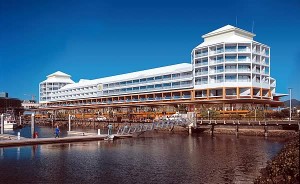 Eclipse Traveler–Solar Eclipse Tours, the sister company to FLO USA, is now offering tours of Australia and New Zealand that coincide with the solar eclipse in the Southern Hemisphere November 14, 2012.
Eclipse Traveler–Solar Eclipse Tours, the sister company to FLO USA, is now offering tours of Australia and New Zealand that coincide with the solar eclipse in the Southern Hemisphere November 14, 2012.
Four separate tours will range from 5 (for travelers not able to stay longer), 8, 12 and 13 nights. Cities such as Cairns, Sydney, Ayers Rock, Melbourne, Auckland, Christchurch, and many more will be visited. Guests will stay in only 5-star hotels on each tour, such as the Shangri-la Marina Hotel in Cairns, the Intercontinental Sydney, the Langham in Auckland, Sofitel Hotel in Queenstown, and the George in Christchurch.
The total eclipse will only be visible by a slither of landmass cutting through the tip of North Queensland (right over Cairns) in Australia for a period of between 2 minutes 4 seconds. The longest part will occur over the middle of the South Pacific Ocean and will last over 4 minutes.
A total solar eclipse is one of the most amazing natural phenomena to experience.
Each eclipse is a different length, and this is one of the most noticeable differences from eclipse to eclipse. As totality approaches, the environment noticeably changes.
Temperature drops of over 10 degrees are not unusual. Observers will be able to see “Bailey Beeds”—where light from the sun breaks through the uneven surface of the moon.
The diamond-ring effect marks the beginning and end of totality as a bright flash of light and it is one of the most amazing parts of the eclipse.
A dedicated team searches for the best locations and carefully arranges the itineraries to provide the best possible eclipse-viewing experience. Due to the huge demand from past travelers, this company decided to start a dedicated website just for eclipse travelers.
FLO USA’s experience in organizing escorted tours met with the knowledge of astronomy lovers and academics to form the ultimate experiences.
Scott Young is an astronomer and science educator from Winnipeg, Manitoba, Canada. He became interested in the sky February 26, 1979, at 11:16 in the morning when a total solar eclipse swept through his hometown and changed his future path forever.
Scott has been active in the amateur astronomy community since the early 1980s, serving as president of the local chapter of the Royal Astronomical Society of Canada twice and as the RASC’s national president 2006–2008. He works in the planetarium field, first as a show presenter and later as Manager Producer of The Manitoba Museum’s Planetarium in Winnipeg and a three-year stint as Director of the Alice G. Wallace Planetarium in Fitchburg, Massachusetts.
Scott is an in-demand presenter, offering talks on astronomy and observing at star parties, conventions and local astronomy clubs across Canada. He is currently the Manager of Science Communication and Visitor Experiences at The Manitoba Museum, overseeing science program and exhibit development as well as planetarium show creation.
Outside of his astronomical experience, Scott is an avid amateur musician.
Asteroid #14698 is named Scott Young in recognition of his contributions to astronomy education.
Eclipse Traveler/FLO USA, 800-276-1168, www.eclipsetraveler.com
